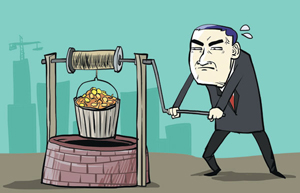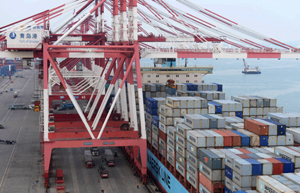 |
|
Cyclists ride past a bar under construction in Hanoi. Countries like Vietnam, Malaysia and Cambodia are best poised to grow rapidly, the World Bank said, with increases in export demand helping to drive domestic consumption. [Photo/Agencies] |
Bigger consumer spending will drive economic growth across entire swaths of Southeast Asia this year and next as consumer classes come online in much of the region, the World Bank said in a recently released report.
For example, overseas Filipino workers are sending bigger remittances back to the Philippines and making it possible for their families to spend more. Cambodia and Vietnam are exporting more textile products, which translate into higher incomes and more cash to spend domestically. Ongoing efforts in Myanmar to open up the country's closed economy are bearing fruit with enviable growth.
These developing economies are doing well, even if growth in the Philippines is down by a couple of percentage points from a year ago. Their larger and more developed neighbors are also growing, although the World Bank has cut its growth expectations for this year and the next for these economies.
On Oct 6, the World Bank slashed its forecast for growth in Indonesia and several other parts of East Asia and the Pacific.
The following day, the International Monetary Fund cut its own outlook for the global economy. The economic recovery around the world is continuing, said the IMF, but it is slower than expected. On a positive note, many of the imbalances that have had the global economy on the edge of a virtual precipice since 2008 have been drastically curbed.
The IMF also lowered its 2014 outlook for growth for Asia and the Pacific to 5.5 percent and to 5.6 percent for next year, but noted that "growth is expected to be driven by domestic demand". It said that favorable financial conditions and healthy labor markets would drive consumption. Export growth could also help, particularly if developed economies and China rebound, as the IMF expects.
The slower growth across the region is in large part driven by the slowdown in China, where the government is looking for sustainability.
The World Bank expects East Asia and the Pacific to grow 6.9 percent this year and the next, down from the 7.1 percent it had previously anticipated. Growth is likely to be slower in 2016 as well, the bank said.
Sudhir Shetty, World Bank chief economist for East Asia and the Pacific, said the outlook was one of "cautious optimism".
China continues to power much of the growth in the region. Even if slower than a few years ago, the country's GDP is still expanding at a prodigious rate.
Growth in China could decline to 7.4 percent this year and 7.2 percent next year, the World Bank said. And yet, "the contribution of consumption to GDP growth in the second quarter was the lowest in five years" at 2.4 percentage points. For that quarter, at least, investment once again emerged as the largest contributor to growth while efforts to rebalance the economy are ongoing.
|
 |
 |
| Time for government to continue cracking whip for sustained progress | Slower growth likely in 2015 |
